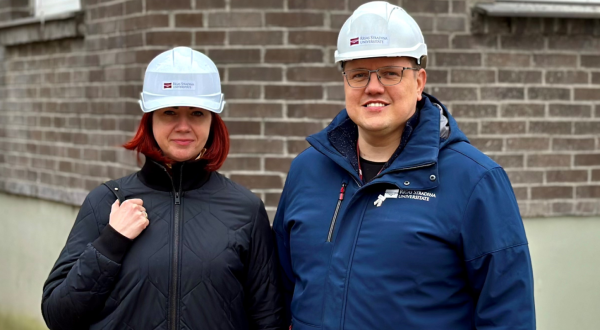I Am a Graduate of Rīga Stradiņš University!
Why would graduates who received their bachelor's, master's or doctoral degrees ten years ago care that their university is still strong, provides excellent education, and has an impeccable reputation? So many years have passed, careers have been established, children have grown up – why should their former university matter? Only for sentimental reasons?
Memories of youth are no doubt important, but my university’s reputation is important to me for practical reasons too. The quality of my education will be assessed according to the quality that my university displays now rather than ten or twenty years ago when I graduated. This has a direct impact on the possible advancement of my career.
How can graduates influence and participate in the development of their alma mater? Some alumni work as lecturers and researchers at the university, however, the overall proportion of graduates working at the university cannot be high as usually professional careers and personal development take them elsewhere. Most of them work and develop their careers in their chosen field and workplace. The Rīga Stradiņš University (RSU) Alumni Association brings together all former students. The RSU Alumni Association currently has as around 700 members including many prominent people in society: Valdis Zatlers, the former President of Latvia; Gundars Daudze, the former Speaker of the Saeima; the majority of Ministers for Health; Jānis Birks, the former Mayor of Riga; Gundars Katlaps, a cardiac surgeon working in the USA; Ombudsman Juris Jansons; Māris Dubņiks, anaesthesiologist and researcher at Lund University Hospital, Sweden; Māris Rēvalds, Chairman of the Board of the Veselības centrs 4 health centre; and other distinguished personalities. Our alumni are respected and valued professionals both in Latvia and abroad. What we all have in common is that RSU was the starting point of our careers.
What can the Alumni Association do to help our university in its development so that it can reach its strategic objectives in the fields of academia, research, internationalisation, external cooperation and be ranked among the top 500 universities of the world as a result?
First of all this entails continued study programme modernisation corresponding to the main contemporary focus, namely alumni preparedness for immediate employment and their suitability to employer needs. There are employers among our members who can take a practical view and see where changes and improvements to the study process are needed in order for graduates to be better prepared for their future jobs. In this regard, alumni play an important role in the development and growth of the university. Medical studies are at the moment undergoing a significant transformation for the programme and skills students acquire to fully match those obtained in medical programmes at other European universities. The Pharmacy and Rehabilitation programmes are planning to carry out similar changes, and two new study programmes, in international diplomacy and international business, are currently being implemented.
The second aspect is research and productivity, which is undoubtedly a significant challenge. The university has carried out a large-scale internal, results-oriented governance reform, has set itself considerably higher achievement goals and has invested a significant amount of funding in financial aid. The Alumni Association has a role to play by actively taking part in discussions with policy makers highlighting certain topics: in the Latvian context the introduction of academic tenure would be conducive to research results as this would set high-level international selection criteria and provide sustainable, predictable funding, credentials and regular performance measurements. This reform is ready to be implemented. A model like this would motivate researchers to seek out international cooperation (it would help reach research productivity goals and attract externally financed research projects), promote interinstitutional cooperation and resource sharing (by saving resources entrusted to the researcher), attract doctoral students and help researchers be able to dedicate all their available time and attention to research. This would be reflected in research productivity, which is what awards the most points in international ratings.
Thirdly, the Alumni Association has set as a goal to create contact points for international alumni. International graduates represent a great potential resource for the internationalisation of study programmes and research. There is more work to be done in this field.
Together with the RSU Convent of Councillors, the Alumni Association is ensuring an active and demanding representation of public interests. I consider that the work carried out by these organisations is productive and has enabled numerous internal changes. Something to be considered is the formalisation of the Alumni Association’s role in representing public interests at the university.
It is time for changes in the field of higher education. I am convinced that everyone is interested in the growth of our country. Each of us has a distinct view of the road ahead and we all have different interests: some want better quality staff, others want reforms, and some just want to be left in peace so that they can work, while others want to watch an exciting show unfold. The task of the Alumni Association is to bring a dose of pragmatism to the process. We are a good resource to use both in representing specific professional fields that expect the university to have a social and economic input, and in demonstrating an understanding and willingness to support the continual development of our university in an organised way.
On behalf of the RSU Alumni Association, I encourage everyone who takes part in the transformation of higher education to recall the wise words of Theodore Roosevelt, the former president of the United States: keep your eyes on the stars, and your feet on the ground. As I see it, the implementation of reforms accounts for the first part of the quote whereas the second part is yet to be achieved.
Related news
 RSU is growing and developing: major reconstruction underway in the main buildingDevelopment, For RSU Employees, For Students
RSU is growing and developing: major reconstruction underway in the main buildingDevelopment, For RSU Employees, For Students



